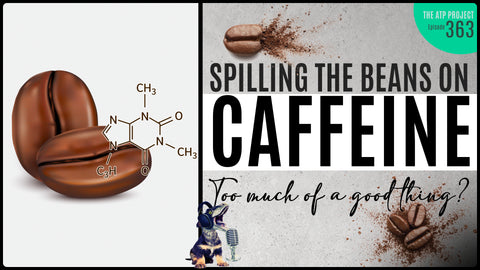Caffeine gets a bad wrap and part of that is probably a lot to do with how much people feel they need to rely on caffeine to get their day going, so the media has led us to believe it's no good for us. Which to be fair, everything in moderation as we always say, but this applies to most if not all things in life! So, everything we have been hearing and the old wives tales around a cup of joe; are they true? Let us take a look at our top 5 favorite myths...
“Caffeine is bad for you!”
Approximately 80% of adults consume caffeine daily, so the notion that caffeine is bad for you that has been driven into our minds by the media and old wives tales is either being blatantly ignored for the sake of getting a dose of pick-me-up juice, or it just isn’t true in the umbrella-like claim that's being made... Caffeine, in fact, was first isolated in 1819 by Friedlieb Ferdinand Runge (you would need a coffee before attempting to pronounce that) and this discovery lead to the use in pharmaceutical applications for central nervous system stimulation as well as stimulation of the cardiac muscle, increased alertness and believe it or not the treatment of headaches…The way in which caffeine works is by binding with adenosine receptors of nerve cells causing the cells to “speed up” meaning that reaction times and the feeling of having more energy are improved. It also helps with the production of dopamine; a chemical messenger between cells, and plays a dominant role in how we feel pleasure! Is it bad for us? This comes back to everything in moderation, doesn’t it… excessively high intake of caffeine is obviously not going to have a good outcome!
“Caffeine is addictive!”
This myth comes from people saying they are “addicted” to caffeine, however, this is more a chosen dependency as it's not recognized by authorities by definition as “addictive”. Regular consumption of caffeine in the form of a coffee, for example, does not lead to the same withdrawal symptoms as that of an addictive substance, when abruptly stopped some users may experience a headache or drowsiness for a day or two before the entirety of it is out of their system and are not inclined to perform drastic measures in order to consume and symptoms can be avoided if the person just gradually drops the amount served.Reference Paper
“Caffeine causes insomnia!”
This is dependant on your liver function more than anything, caffeine is readily used and ridden by the body. Caffeine works extremely quickly in the body and reaches peak level in the bloodstream usually within 30-60 mins depending on the individual's ability to absorb. Its half-life, which is the time in which it takes for this compound to be removed by the body is 3-5 hours so in total it's removed entirely in 6-10 hours. Your timing may affect your sleep, but one cup in the morning is not likely to be the reason you aren’t sleeping well.Reference Paper
“Caffeine intake increases osteoporosis!”
There is some credit to this myth, at extremely high doses… we are talking 7 standard cups of coffee a day; there will be an impact on how much calcium and magnesium are excreted through your urine as it can begin to impact your absorption of vitamins and minerals and due to its phenolic compounds, may inhibit iron absorption too. However, if you are having plenty of these vitamins and minerals in your diet and having only a standard cup of coffee in the morning or before a workout, not 7 and not pairing it with your main meals then you are more than likely to notice no effect.But, it's not the Caffeine that’s doing it, it’s the coffee as a whole. Tea and Coffee contain high amounts of polyphenol compounds and Tea more so. Tea affects iron absorption more than coffee! To give some perspective, coffee that is taken with an iron-rich meal only appears to impact 6% of iron absorption from that meal, which is minuscule and not actually depleting your stores of what is already present in the body, just the GI Tract.
Reference Paper
“Caffeine dehydrates you!”
This is one that gets drilled into us all the time! But, here to bring you the good news… this is a big old myth. In a study done to measure Total Body Weight over the course of a 24 hour period, those consuming coffee beverages and water in a total volume of hydration for the average adult requirement and a comparative of just water, there was no significant difference on water volume lost during this time frame. Renal function remained constant across both, no changes in blood urea nitrogen or serum creatinine in both trials. Even in a more recent study to suggest that caffeine isolated in a capsule form provided at 5mg per KG of body weight per day proved to be ineffective in changing total body weight.The only noticeable difference in the two trials was to do with urinary sodium in the trial group consuming caffeine and this was because properties in coffee, both Theophillin and caffeine increase sodium excretion by inhibiting salt/sodium transport along the proximal convoluted tube meaning that levels will read higher. However, while sodium is needed for urine production it does not contribute to the sole aspect of urinary volume and so cannot be marked as proof of diuretic effect.
Reference Paper
Take home message...
Everything in moderation. Caffeine is naturally occurring in Teas, coffee and things such as chocolate. Be mindful of your intake, more is not always better which is another facet of health we are huge advocates of. Find what works for you, that's inevitably what it comes down to!
To find out more on this topic listen in to episode 366 of the ATP Project podcast.
Or check out the video version on YouTube:


















